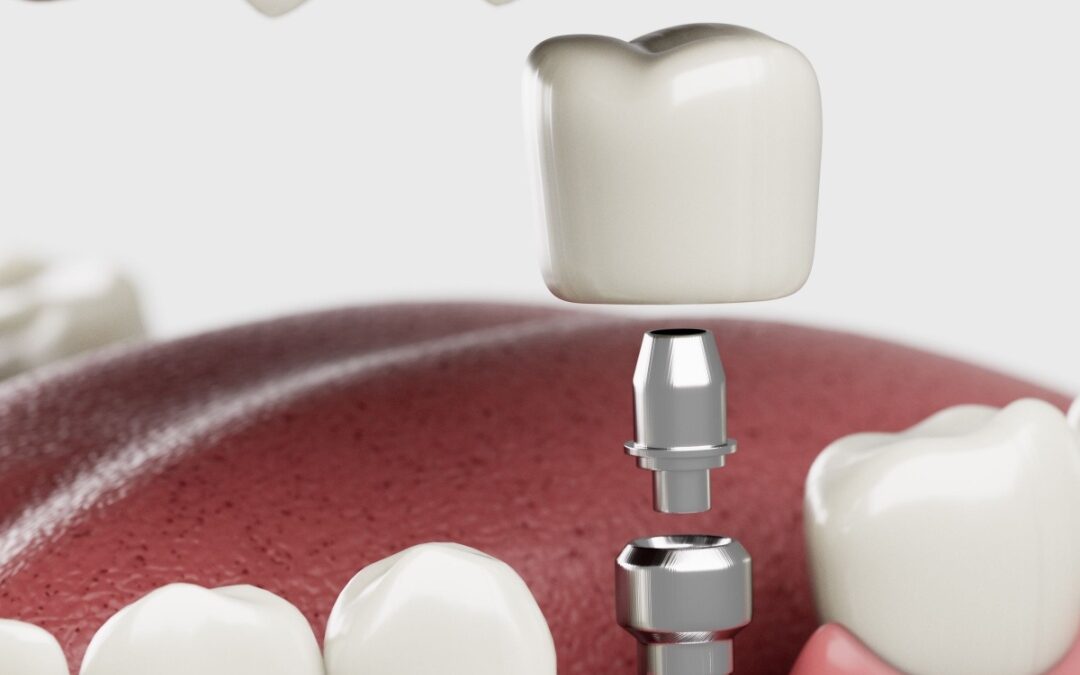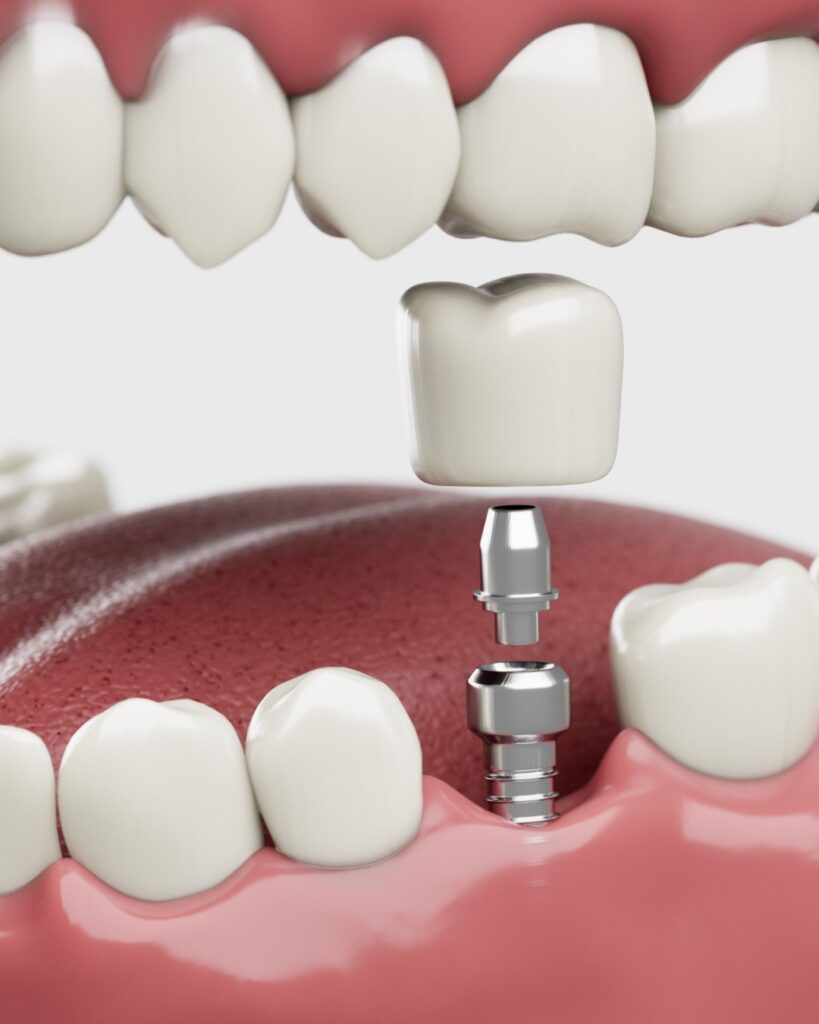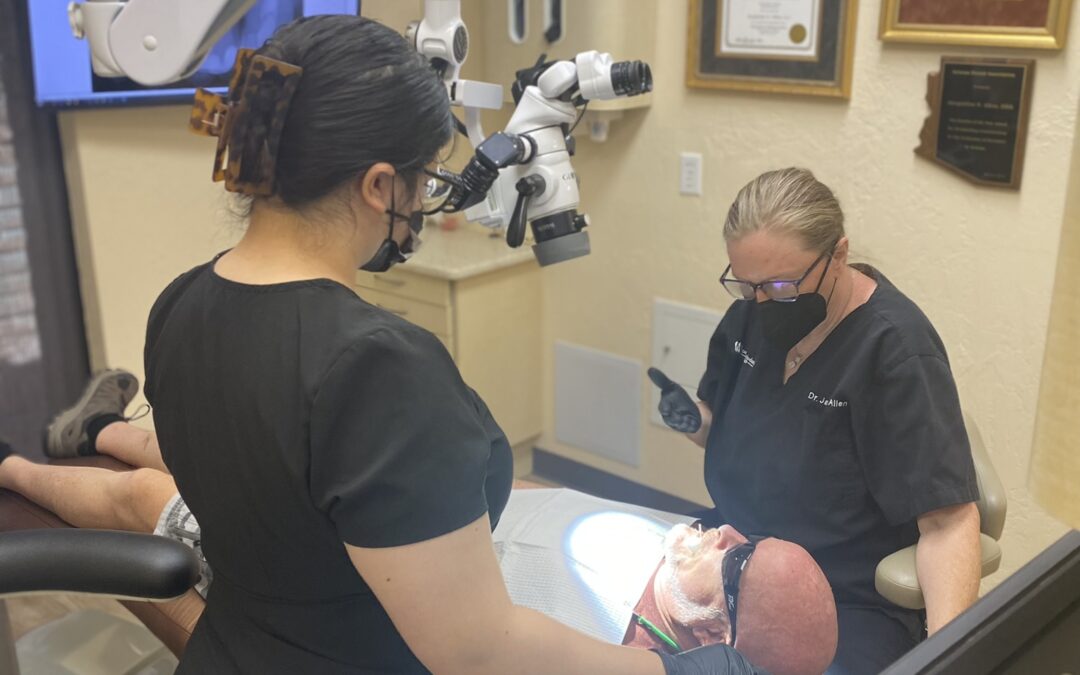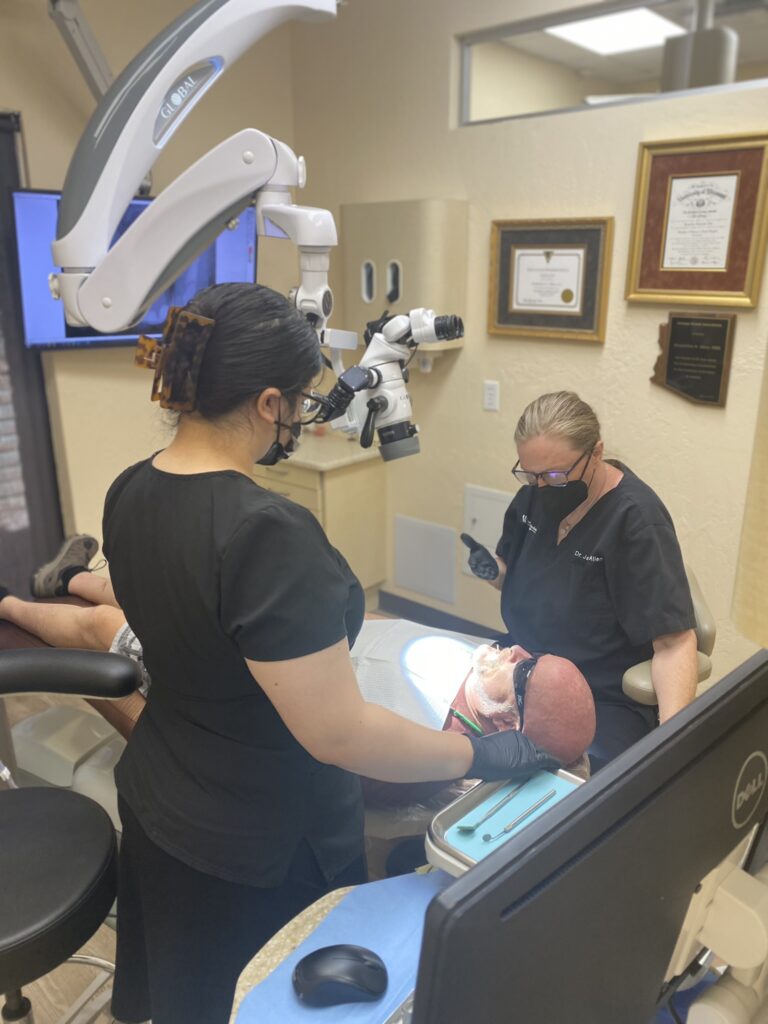
by Dr. Jacqueline S. Allen | Jun 3, 2025 | Dental Implants
 In today’s era of information overload, there’s nothing wrong with focusing on the basics. Trustworthy medical and dental websites often publish pages or posts addressing frequently asked questions or offering a “101” level review of an important topic.
In today’s era of information overload, there’s nothing wrong with focusing on the basics. Trustworthy medical and dental websites often publish pages or posts addressing frequently asked questions or offering a “101” level review of an important topic.
Likewise, here are five facts about dental implants to give you a baseline of understanding, so you can discuss dental implants with your dental professional.
5 Important Facts About Dental Implants
- Dental implants can stop bone loss in your jaw. When teeth are lost due to injury or decay, you lose bone density in your jaw. Implants can prevent this loss and help restore your jaw’s structure by reducing the load on the remaining natural teeth.
- Dental implants can replace one – or all – of your teeth. While the methods vary, implants can be used to replace one, a few, an entire arch, or even all your teeth. Dental implants place biocompatible metal posts where the tooth roots have been, adding an artificial tooth restoration above the gum line.
- Dental implants need time to osseointegrate into your jaw. Some patients can get “teeth in a day” dental implants; others require multiple visits to supplement the jaw with bone grafts and other steps to ensure success. It’s important to understand the posts placed below the gum line will need time to bind with the bone in your jaw to function at their maximum effectiveness. This process, known as osseointegration, can take several months.
- Dental implants require a post-procedure recovery plan. Immediately after your dental implants are placed, you will need a recovery period. You’ll need to eat a soft-food diet and monitor your mouth carefully for signs of infection at the implantation site. The initial healing can take one or two weeks. Osseointegration, as mentioned above, can take six to eight weeks.
- Dental implants can create dramatic improvements in how you speak, eat, and smile. Dental implants are popular because they reverse the negative legacy of natural tooth loss. Many patients report being able to eat all the foods they used to love, speak with greater clarity and diction and – best of all! – feel comfortable smiling and laughing in ways that show off their smiles.
If you have lost one or more teeth, you can schedule a visit with your endodontist or other dental professional to assess your current oral health and develop a treatment plan based on your individual needs.
Call Our Office Today For Answers To Your Dental Implant Questions
Don’t let lack of knowledge about dental implants stand between you and better oral health. Call 602-242-4745 to make an appointment with the Phoenix Endodontic Group to discuss dental implants today.

by Dr. Jacqueline S. Allen | Sep 4, 2024 | Dental Implants
 If you have failing or missing teeth, you may be investigating dental implants as a possible solution. While root canals can often save natural teeth, sometimes teeth are beyond saving, and retaining a full mouth of teeth is essential for maintaining your natural bite, as well as your natural smile.
If you have failing or missing teeth, you may be investigating dental implants as a possible solution. While root canals can often save natural teeth, sometimes teeth are beyond saving, and retaining a full mouth of teeth is essential for maintaining your natural bite, as well as your natural smile.
Dental implants can be a great investment for many patients. Their long-term success rate is above 90 percent, and nine out of 10 patients say they are happy with the end result. Getting the most out of your implants begins with preparing for your procedure properly. We’ve assembled a list of key tips to get you started on your road to implant success.
6 Tips To Aid Dental Implant Recovery And Post-Recovery Success
- Learn about how dental implants will change your life. It doesn’t hurt to have a little motivation going into your implant surgery! Implants can give you back your full smile and help you erase issues with chewing and speaking clearly. They can also help combat bone loss in your jaw.
- Be aware of any health conditions that could impact your recovery. The dental professional who performs the dental implant will do a thorough exam beforehand. They will address conditions such as diabetes in terms of implant success, as well as dental issues such as bruxism (teeth grinding). They will also discuss your options for addressing the impact of tobacco use on implant success, since smoking reduces bone density and slows wound healing.
- Understand the dental implant process timeline. Being clear about how long the process of placing your implant will take ensures you can take the right steps to focus on your recovery. Your dentist will let you know if you will receive your implant through a “teeth in one day” (one-step) process, or if you will require multiple steps (and appointments) before your implant is complete. They will also discuss whether you need preliminary procedures before the implant, such as bone augmentation, to make sure the implant integrates properly into your jaw.
- Prepare for your initial appointment properly. Some of the steps taken before your dental implant appointment may seem familiar if you’ve had another type of surgery. You’ll receive instructions on things like when to stop smoking before surgery, when to limit food and liquid intake, and any medications you will need to take ahead of the procedure. Follow your dentist’s directions closely, and ask questions if you have concerns.
- Know what to expect immediately after dental implant surgery. You’ll want to take it easy for the first three days after your implant surgery. Your dentist may send you home with pain relievers and antibiotics – if they do, take them as prescribed. It’s normal to experience some minor bruising and bleeding, and for you to feel pain around the implant site, but contact your dentist if these don’t subside quickly. You’ll need to follow a soft-foods diet until your gums heal.
- Develop a self-care routine to ensure dental implant success. You will need to care for your dental implants like natural teeth. That means brushing twice a day, flossing daily, and visiting your dentist regularly. Checkups allow your dental professional to see how the implant is impacting your other teeth and gums and provide suggestions to help you keep your dental implants for a lifetime.
“The recovery period after dental implant surgery is one of the most critical phases of the process,” says Dr. Jacqueline S. Allen, who practices with the Phoenix Endodontic Group. “Our team can walk patients through each step, so you feel confident before, during, and after the procedure.”

by Dr. Jacqueline S. Allen | Aug 1, 2024 | Dental Implants, Root Canal

More than 25 million root canal treatments are performed each year in the United States – that’s an average of more than 68,000 every day. Yet myths persist about root canal treatments, decades after they have become a common dental treatment. Nearly 15 percent of Americans put off needed dental care due to fears and anxiety, so it’s important to address misconceptions about root canals. Here are the facts to set to rest five of the most harmful and persistent myths about root canal treatments.
Busting 5 Common Myths About Root Canal Treatments
- Root canal treatments hurt. Today’s root canal treatments are delivered using modern local anesthetics or light to moderate sedation, and employing cutting-edge technology such as GentleWave to ensure a thorough and complete cleaning of the infected tooth roots. On top of that, endodontists are experts in pain management, so they work carefully to minimize any discomfort during or after the procedure.
- Having a root canal will make me sick. This myth, based on poorly conducted, long-debunked research done nearly a century ago, is particularly troublesome. The infection in your failing natural tooth will not “travel” anywhere else in your body. Nor will the root canal treatment itself give you cancer. In fact, recent research indicates that patients with multiple endodontic treatments had a greatly reduced risk of head and neck cancers.
- It’s better to extract a tooth than have a root canal. Tooth extraction is rarely an endodontist’s top recommendation. Missing teeth cause lifelong oral health challenges, and artificial replacements such as implants or bridges require more time and preparation to provide, as well as more investment, compared to a root canal.
- I’m not experiencing (X symptom), so I don’t need a root canal. While symptoms such as pain with a quick onset, tenderness to pressure on the tooth, or swelling of the surrounding tissues are common indications you need root canal treatment, absence of these symptoms does not rule out the need for one. Endodontists look for clinical signs that may not be obvious to you, but which give a more accurate picture of what’s going on inside your tooth.
- After my root canal treatment, I don’t need to do anything else. Natural teeth saved by a root canal can last a lifetime with proper care. A dental crown placed on top of a tooth after receiving a root canal treatment is a critical part of proper care. The crown provides stability and enhanced protection from tooth decay or infections due to a cracked or broken tooth. This step is not optional. In fact, your endodontist may follow up to ensure you’ve had a crown placed within a few weeks of your root canal.
Get The Facts About Your Situation – Make An Appointment Today
Learn more about the advantages of the root canal treatment process at the Phoenix Endodontic Group. Our staff is happy to conduct a detailed examination and review what you need to do to save your natural tooth. Call 602-242-4745 today to schedule an appointment.

by Dr. Jacqueline S. Allen | Mar 1, 2024 | Blog, Dental Implants
[lwp_divi_breadcrumbs home_text=”…” before_text=”…” disabled_on=”on|on|on” _builder_version=”4.24.3″ _module_preset=”default” disabled=”on” global_colors_info=”{}”][/lwp_divi_breadcrumbs]
 When making a major investment, it’s always wise to do some research. No one wants to commit funds to something not a trusted, proven solution – especially when facing a painful dental condition demanding attention.
When making a major investment, it’s always wise to do some research. No one wants to commit funds to something not a trusted, proven solution – especially when facing a painful dental condition demanding attention.
Dental implants financially benefit recipients in many ways. Some of the financial benefits are clear, such as a long-lasting return on your investment in preserving your smile. While more obvious benefits appear focused on goals such as improved health, when you consider how a healthier mouth contributes to your fiscal wellbeing over the years, you begin to realize the investment’s true value.
Here’s a quick overview of some ways dental implants can be a good investment for patients dealing with tooth loss.
What Makes Dental Implants A Good Investment?
- Dental implants can last a lifetime. Dental implants hold up well year after year when cared for properly.
- Dental implants can improve oral health. There are risks to your gums and to the health of your remaining natural teeth with dentures or bridges. Implants reduce chances you’ll spend extra money resolving a gum infection or repairing teeth altered by bridge work.
- Dental implants can improve your ability to chew. Denture-wearers may find the foods easiest to eat with dentures contain high amounts of calories, fat, and sugar. Poor nutrition leads to expensive (potentially deadly) medical issues. Implants allow a return to eating nutrient-dense foods like fruits, vegetables, and nuts.
- Dental implants can stop bone loss in your jaw. With loss of natural teeth, it’s possible to lose as much as 25 percent of the width of your jawbone in the first year. Because dental implants gradually integrate into your jaw, they provide stimulation to the bone similar to your natural teeth and can slow or halt bone deterioration.
“When I discuss the value of dental implants with patients, I remind them that the benefits of implants become obvious over time, often exceeding initial expectations,” says Dr. Jacqueline S. Allen, who practices at the Phoenix Endodontic Group. “Our clinicians are delighted to discuss how dental implants may address your specific oral health challenges.”

by Dr. Jacqueline S. Allen | Sep 6, 2023 | Blog, Dental Implants, Endodontist

Placing something artificial in your jaw can be intimidating. However, modern dental implant practice has been around for more than 50 years and is safe, health-enhancing, and life-changing.
If your endodontist recommends a dental implant to replace one or more natural teeth, understanding the process can help you better prepare. Here’s a brief summary.
Steps In The Dental Implant Process
Step 1: Evaluation and planning. Before the actual implant is placed, you’ll have an appointment where your endodontist performs a comprehensive examination. They will take X-rays or use technology like Cone Beam Computed Tomography (CBCT) to get a three-dimensional image. They also review current medical conditions (such as diabetes) and develop a treatment plan.
Step 1a (as needed): Bone graft. If your jaw isn’t strong enough to support the implant, you may need a bone graft before the implant. This requires a separate appointment, with time in between, allowing the graft to heal.
Step 2: Pre-op preparation. Your endodontist will discuss preparations for the dental implant procedure. This includes whether you need antibiotics or should eat before your appointment.
Step 3: Natural tooth removal/dental implantation appointment. You will receive anesthesia (local or IV), ensuring the procedure is pain-free. Failing natural teeth are removed. Next, the endodontist places a titanium tooth root implant in the empty bone socket. They finish with stitching the gums above the implant.
Step 4: Osseointegration. After your dental implant is placed, the healing period lasts several months. As the bone in your jaw recovers, it grows around the implant – a process known as osseointegration. This results in the implant being solidly anchored in the jawbone.
Step 5: Placement of abutment and crown. The final step is placing the abutment, which sits atop the implant post and attaches to a crown. If you are missing multiple teeth, the abutment can also attach a set of overdentures, replacing an entire arch of natural teeth.
“Dental implants take time, even if the implant procedure only takes one appointment,” says Dr. Jacqueline S. Allen, who practices with Phoenix Endodontic Group. “We are happy to discuss step-by-step the dental implant process, so you feel 100 percent comfortable 100 percent of the time.”

by Dr. Jacqueline S. Allen | Feb 20, 2023 | Blog, Dental Implants, Dentistry
Dental implants have provided many of us with reliable, attractive, and functional teeth in recent decades. Smiles impacted by total or partial natural tooth loss have been restored to their previous luster – or better!
However, while dental implants have a success rate upwards of 95 percent, failure is possible. You can feel more confident about having a dental implant procedure, and protect your investment in a future that includes robust oral health, if you understand several key factors leading to dental implant success.

What Makes A Dental Implant Successful?
- An accurate diagnosis. Making sure that dental implants are a workable approach to addressing failing or missing teeth is a crucial first step. Your dental professional will do a thorough dental examination, ask questions about your overall health, and assess your gums and your jaw’s bone density.
- Prompt execution of the dental implant procedure. Once it’s been determined that dental implants your solution, planning should begin immediately. Dental implants are completed in stages, with healing time in between each one, so the sooner the process begins, the better.
- Systemic health concerns are addressed. Diabetes, smoking, low bone density, and gum infection can all make your dental implant more likely to fail. Discuss any health issues with your practitioner and follow their directions, as well as those of the rest of your care team.
- A skilled practitioner using up-to-date technology. Dental implants go more smoothly when a dentist has additional training in implants and has the tools to place the implants accurately. The Phoenix Endodontic Group, like many practices that place dental implants, utilizes cone-beam computed tomography (CBCT) technology, providing 3-D images of our patients’ soft tissues, teeth, nerves, and bone in one scan.
- Your commitment to ongoing care. Your commitment to proper self-care can make or break a dental implant’s success. To avoid the most common reasons for dental implant failure, you’ll need to brush and floss your implants daily, visit your dentist regularly for checkups, get LOTS of calcium, and proactively address conditions that damage your mouth, such as smoking and bruxism (grinding your teeth).
“Many of our dental implant clients do not initially realize that the success of the implant procedure requires partnership between them and their dental professional,” says Dr. Jacqueline S. Allen, who practices at the Phoenix Endodontic Group. “Our staff work closely with clients before, during, and after the dental implant process to ensure best results.”

 In today’s era of information overload, there’s nothing wrong with focusing on the basics. Trustworthy medical and dental websites often publish pages or posts addressing frequently asked questions or offering a “101” level review of an important topic.
In today’s era of information overload, there’s nothing wrong with focusing on the basics. Trustworthy medical and dental websites often publish pages or posts addressing frequently asked questions or offering a “101” level review of an important topic.

 If you have failing or missing teeth, you may be investigating dental implants as a possible solution. While root canals can often save natural teeth, sometimes teeth are beyond saving, and retaining a full mouth of teeth is essential for maintaining your natural bite, as well as your natural smile.
If you have failing or missing teeth, you may be investigating dental implants as a possible solution. While root canals can often save natural teeth, sometimes teeth are beyond saving, and retaining a full mouth of teeth is essential for maintaining your natural bite, as well as your natural smile.

 When making a major investment, it’s always wise to do some research. No one wants to commit funds to something not a trusted, proven solution – especially when facing a painful dental condition demanding attention.
When making a major investment, it’s always wise to do some research. No one wants to commit funds to something not a trusted, proven solution – especially when facing a painful dental condition demanding attention.

